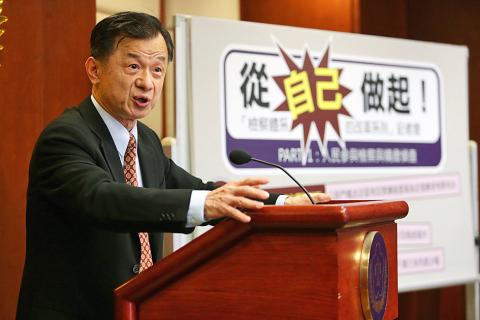The Ministry of Justice yesterday announced a set of measures to reform the prosecutorial system — including allowing public input in the evaluation of prosecutors — to meet public calls for changes and pave the way for the upcoming national affairs conference on judicial reform.
“Many people have expressed their concern over the scrutiny of prosecutors and their conduct in handing criminal cases. They have also expressed their support for more public input in the judicial process,” Minister of Justice Chiu Tai-san (邱太三) told a news conference, where he was joined by Prosecutor-General Yen Ta-ho (顏大和) and Taiwan High Prosecutors’ Office Chief Prosecutor Wang Tien-cheng (王添盛).
“The ministry is willing to lead the change by starting with reforms to the prosecutorial system,” Chiu said.

Photo: CNA
The new measures include enhancing teamwork and promoting investigative competence, raising the threshold on indictments, adding public input in the “prosecutors’ review committee” and improving the system for evaluating prosecutors’ performance.
To improve teamwork and competency, Chiu said the name of the head prosecutor and subordinate prosecutors handling major criminal proceedings should be listed for public scrutiny.
“We have seen prosecutors diligently put in efforts to improve their work in recent years, maintaining a conviction rate of more than 96 percent and a non-conviction rate of about 3 percent,” Chiu said. “We cannot compare yet with Japan’s more than 99 percent conviction rate, but our prosecutors are doing good work compared with other advanced, democratic countries.”
He said Taiwan compares quite favorable with the US and Germany, whose non-conviction rates are 8.7 percent and about 3 percent respectively.
“We do have flaws in a few of the prosecution cases, and since these cases have affected individuals’ rights, they have led to an accumulation of public discontent and grievances. The public naturally expects prosecutors to conduct prosecution in a thorough and meticulous manner. The ministry must therefore lead the way to reform, instead of becoming the target for reform in the upcoming national affairs conference,” Chiu said.
To enhance the evaluation system for prosecutors, members of the public will be chosen to join the prosecutors’ review committee and committee members will be empowered to initiate probes into cases deemed in need of redress or rectification, he said.
The committee would be vested with the authority to mete out disciplinary measures upon finding negligence or wrongdoing by prosecutors, he said.
At present, the committee can only make recommendations for prosecutors, which could be overturned by other committees, resulting in accusations of prosecutors covering up for their colleagues.

A Taiwanese software developer has created a generative artificial intelligence (AI) model to help people use AI without exposing sensitive data, project head Huang Chung-hsiao (黃崇校) said yesterday. Huang, a 55-year-old coder leading a US-based team, said that concerns over data privacy and security in popular generative AIs such as ChatGPT and DeepSeek motivated him to develop a personal AI assistant named “Mei.” One of the biggest security flaws with cloud-based algorithms is that users are required to hand over personal information to access the service, giving developers the opportunity to mine user data, he said. For this reason, many government agencies and

The National Fire Agency on Thursday said a series of drills simulating a magnitude 8.5 earthquake would be held in September to enhance the government’s emergency response capabilities. Since earthquakes cannot be predicted, only by continuously promoting disaster prevention measures could Taiwan enhance its resilience to earthquakes, agency Director-General Hsiao Huan-chang (蕭煥章) said in a news release. The exercises would be held to mark annual National Disaster Prevention Day on Sept. 21, the aim of which is to test Taiwan’s preparedness and improve its earthquake resilience in case of a major temblor, Hsiao said. As part of those drills, an earthquake alert would

DEFENSE: The National Security Bureau promised to expand communication and intelligence cooperation with global partners and enhance its strategic analytical skills China has not only increased military exercises and “gray zone” tactics against Taiwan this year, but also continues to recruit military personnel for espionage, the National Security Bureau (NSB) said yesterday in a report to the Legislative Yuan. The bureau submitted the report ahead of NSB Director-General Tsai Ming-yen’s (蔡明彥) appearance before the Foreign and National Defense Committee today. Last year, the Chinese People’s Liberation Army (PLA) conducted “Joint Sword-2024A and B” military exercises targeting Taiwan and carried out 40 combat readiness patrols, the bureau said. In addition, Chinese military aircraft entered Taiwan’s airspace 3,070 times last year, up about

STRICTER ENFORCEMENT: Taipei authorities warned against drunk cycling after a sharp rise in riding under the influence, urging greater public awareness of its illegality Taipei authorities have issued a public warning urging people not to ride bicycles after consuming alcohol, following a sharp rise in riding under the influence (DUI) cases involving bicycles. Five hundred and seven people were charged with DUI last year while riding YouBikes, personal bicycles, or other self-propelled two-wheelers — a fourfold increase from the previous year, data released by the Taipei Police Department’s Traffic Division showed. Of these, 33 cases were considered severe enough to be prosecuted under “offenses against public safety,” the data showed. Under the Road Traffic Management and Penalty Act (道路交通管理處罰條例), bicycles — including YouBikes and other